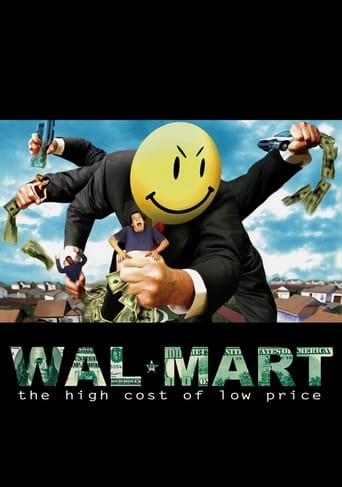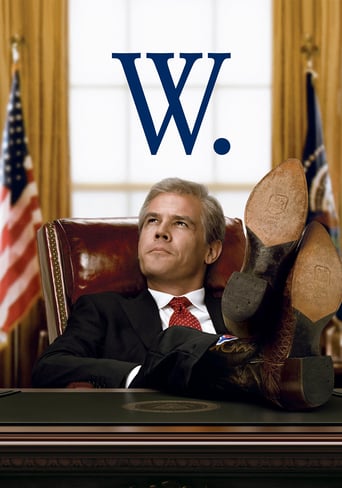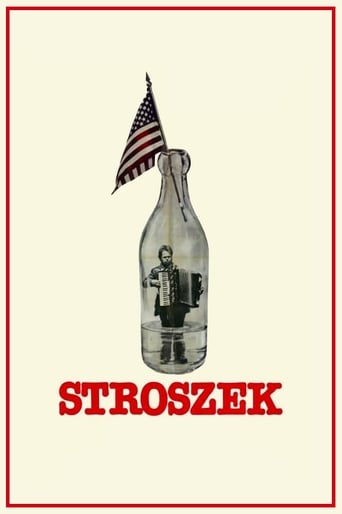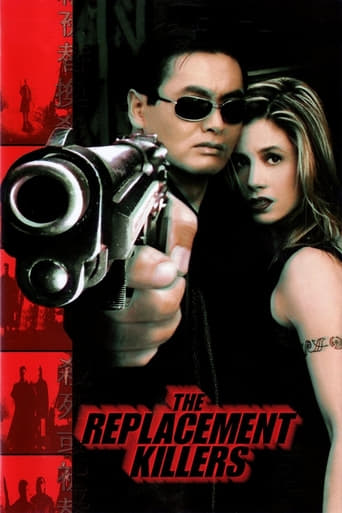Wal-Mart: The High Cost of Low Price (2005)
This documentary takes the viewer on a deeply personal journey into the everyday lives of families struggling to fight Goliath. From a family business owner in the Midwest to a preacher in California, from workers in Florida to a poet in Mexico, dozens of film crews on three continents bring the intensely personal stories of an assault on families and American values.
Watch Trailer
Free Trial Channels
Cast


Similar titles
Reviews
Simple and well acted, it has tension enough to knot the stomach.
It is an exhilarating, distressing, funny and profound film, with one of the more memorable film scores in years,
By the time the dramatic fireworks start popping off, each one feels earned.
Blistering performances.
**May contain spoilers!!Wal-mart: The High Cost of Low Price is a documentary produced in November of 2005 by Robert Greenwald and Brave New Films. Greenwald and Brave New Films take an extraordinarily biased approach that will make you feel, think, and probably shop differently. If you don't already know or understand what's wrong with Wal-mart, this documentary will without a doubt fill in the blanks. This documentary exposed Wal-Mart's unprincipled business practices through interviews with former employees and executives and small business owners of communities Wal-mart inhabited. The film leaps into the incredibly personal stories and everyday lives of families and communities struggling to fight an invasive giant. A working, single mother is forced to rely on government assistance to provide health care for her two children. A Missouri family loses its business after Wal-Mart receives over $2 million to open its doors down the road. A Chinese woman worker is forced to work in intense heat in Wal-mart factories for minimal pay. A mayor struggles to provide for his first responders after Wal-Mart leaves and relocates just outside the city limits. Hundreds of lawsuits take place each year against the retail giant. There is not one main narrator in this film, but rather countless people we interact with every day in our local hardware stores or family-owned grocery stores, which makes this documentary hit a little closer to home. Many people don't realize what is happening with Wal-mart and the negative impacts it's making, but the numerous narrators bring it to light. It's difficult to not be biased while watching this documentary. Real accounts by real people describe their difficulties and struggles because of Wal-mart's actions. For example, the documentary begins in a small town called Middlefield, Ohio. Long established, independently owned stores were nearly destroyed. The Hunter family, who opened H&H Hardware and has run it for many generations, was driven out of business because local people saw Wal-mart as a cheaper and more easily accessible outlet for goods. Wal-mart is a monopoly and no control has been legislated to protect free enterprise in these towns they takeover. Its strategy, supposedly, is to "crush the competition". Millions of dollars in tax abatements are given to Wal-mart to establish itself in a new location, but local owners seeking equal abatements are turned down. Cities are often between a rock and a hard place because if they don't provide Wal-mart with what they want, the company will simply pick up and leave said location leaving the town deserted. When Wal-mart leaves, it takes away key jobs that may not have existed before in the town.As many as 31 states have filed lawsuits against the Goliath for unfair employee practices, unpaid wages, and discriminatory accusations. Wal-mart is aggressively anti-union. At a minimal threat from unions, as described in the film, three managers were flown by jet immediately to the "problem store" and identified and fired specific employees pertaining to the nuisance. They would halt employee wages and blame its actions on the unions in the area. Wal- mart's employees, nearly 70% women, have been bombarded by discriminatory remarks from their managerial staff. A $1.6 million lawsuit has been filed against Wal-mart for its discrimination against women (Wal-mart). Different opinions and thoughts can be devised simply by the way a documentary is portrayed. Throughout this documentary, first hand accounts of experiences of employees, managers, and community members helped shape the biased directive for this film. Having these people narrate this documentary allowed audience to be more drawn in to the subject and be more in-tune to the real story of the film. In my own experience, it allowed me to closely relate a lot more to the people narrating this documentary. The film mostly entailed a narration by these people and also depictions of strikes and commercials that supported the problems these people faced with the Wal-mart Corporation. Being able to see these protests by the employees and "fake" commercials by this behemoth company gave even more of a reason to dislike it. If there was only one narrator in this film, I feel it would have been a lot more difficult to understand the reasoning behind it. By supplementing it with countless interviews and first-hand accounts, it gave the audience a bigger case against Wal-mart and more evidence of its wrongdoings. All in all, as easily seen by this documentary, Wal-mart is not what everyone may think about it. Wal-mart portrays itself in commercials as a stellar employer in employee treatment, community involvement, environmental protection, charitable offerings, and human rights. This is obviously not the case. As presented by these many narrators, Wal-mart is far from what they appear to be. Wal-mart may be beneficial to those who cannot afford higher priced clothes or food, but in the end it is hurting us more than helping. As a massive, hypothetical cycle, we buy, employees work, employees apply for government assistance, taxpayers pay this assistance, and Wal-mart gets richer every year. Wal-mart then proceeds to construct more and more stores, which need more and more employees and the cycle continues. This cycle will always continue so long as Wal-mart has this overwhelming power over these cities and its people.
This film is so poor that someone needs to make a documentary on just how badly put together and presented the whole debacle is - I'd eagerly watch that.I went into this film hoping for some insight into how WalMart operates, perhaps people from the inside, blowing the whistle on devious tactics that both shock and impress. And it's not without that, there are a few gems in there, but they are needles in a haystack of badly presented emotionally led accusations from people who clearly have an Axe to grind.I have given two stars on the basis that to interview such a large number of people must have taken some significant effort, other than that I cannot find any other merit.I can usually listen to a one sided argument and I can usually tolerate emotional accusations, however watching this film is actually bordering on painful. The production is so poor it's plays like a bad conspiracy theory video found on a video sharing site. Almost every interview has background noise crashing away, suggesting a microphone hadn't been used, this is so frequent and glaring it actually becomes comical. What is a little depressing though is this is the collaborative effort of a production team consisting of over 100 people.Then there is the soundtrack, which further compounds the problem. To give you an idea of what it's like watching the interviews, have someone mumble something to you while using a food mixer and another person play harmonica directly into one ear. It's genuinely offensive to the ears, and the eyes too as shaky slow motion footage of WalMart stores is constantly paraded across the screen with statements badly overlaid.What's embarrassing is the film often cuddles up those who'd capitalized on their local community and have now been beaten at their own game. I don't like watching a family having to close their business, but I struggle to sympathize with their self entitlement, particularly from sobbing siblings grumbling their significant inheritance has imploded.Worse still are the arguments, and how they are presented, the interviews are so hacked up they are at a near parody of themselves. The film is a seemingly endless stream of disgruntled short ranting sentences that carry little weight. Occasionally a WalMart advert flashes up, sometimes an identical looking parody made by the filmmakers.Cheap, biased, manipulative and destructive - Words that can accurately describe WalMart and this Documentary. I honestly believe its so badly finished because even the production crew couldn't bare watching through it more than once.
Wal-Mart: The High Cost Of Low Price scores high for its strong message. In a classical political pamphlet Greenwald makes exposes facts about Wal-Mart that make your jaw drop, even though you don't have to agree with him.What bothered me extremely was it's horrible production value though. The soundtrack really stands out for its horrible quality. It is sometimes not anything better than experimental student television. As if they never watched the end product, pompous music is played bluntly over quotes as if they don't matter, and it seems they never took someone with them that had any knowledge of recording sound. Especially towards the end, I sometimes put my hands to my ears because of the wall of noise that was coming towards me.Bad editing is key. Cheap footage is abundant. The camera (wo)man was creative in its framing, but seemed to suffer from Parkinson's.Greenwald has wrapped a strong political message in a wet and wrinkled newspaper, instead of the great wrapping that it deserves.
I agree that this documentary Wal-Mart the High Cost of Low Price, is clearly showing us just one side of the story which as we all know is Wal-Mart= Bad and this makes it not very credible in its reporting.But I don't wanna see some lawyers and CEO's and spokespeople defend Wal-Mart and its greedy paws. Of course every giant corporation and bureaucracy operates (more or less) in a similar fashion as Wal Mart and I know they are not the only bad corporation in America and the world (just like Nike wasn't the only one with sweatshops 5 years ago) but that is not an excuse. I think people deserve and want to know all the dealings of Wal Mart and its exploitation of its workers and the corporate system in their favour. We need to know and they need to know that we know. And just because Michael Moore gave Wal Mart bad rap in Bowling for Columbine doesn't mean the story ends there- true WalMart is an easy target but again, Michael Moore never went in detail of the way Wal Mart works as a business and this is what this documentary does.For example, I am sure we are all quite conscious of the bad synonyms surrounding Wal Mart (especially about driving small businesses into bankruptcy, having sweatshops and the latest revelation of illegal workers). But all that wasn't enough for me to hate Wal Mart since it seems that today 99% of big companies operate in a similar fashion- not that it makes it right. On top of it, I would see all those happy commercials telling us Wal Mart cares about its employees and its customers, it gives back to the community yadda yadda yadda, so what is one to think? BUT then, when you finally see what Wal Mart doesn't provide health insurance for its workers, makes them use government subsidies, low wages, long hours, steals hours, discriminates against women, allows racism, intimidates and spies on its workers, anti-UNION, doesn't care about pollution...and etc, you finally get the big picture of it all.
















